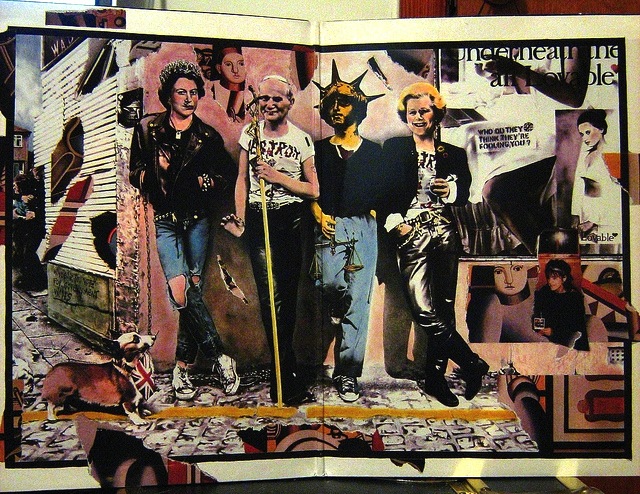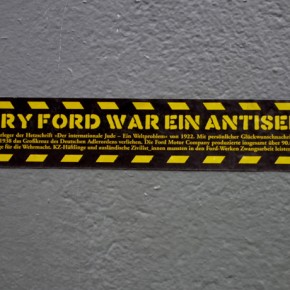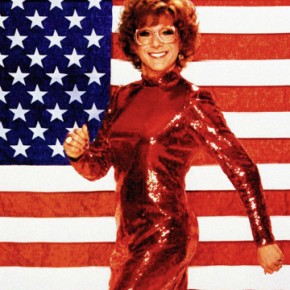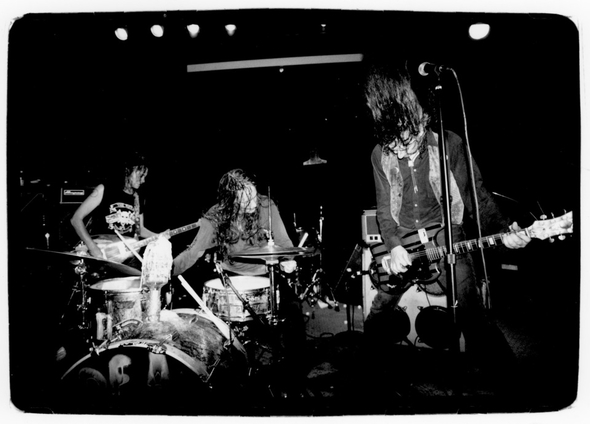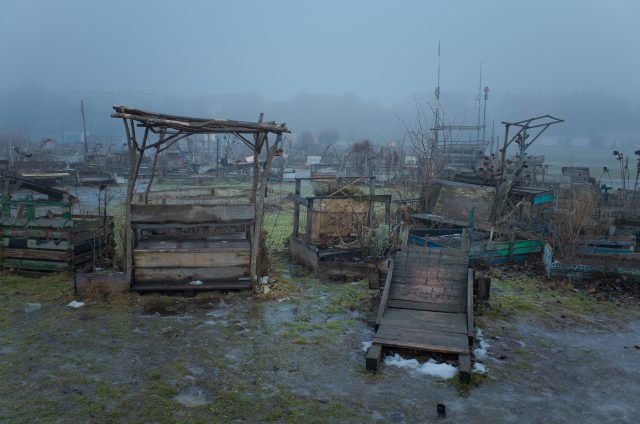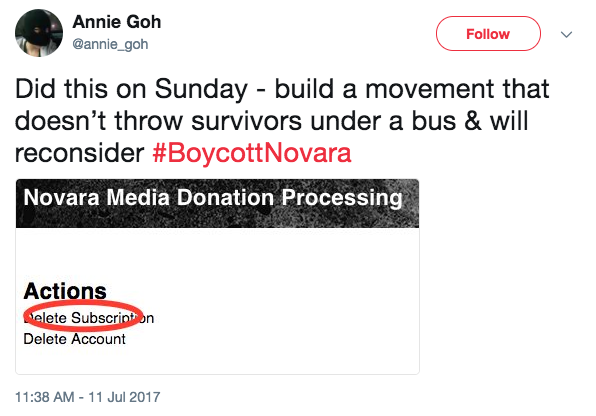Few cultural movements have left more of a mark than DIY (Do-it-Yourself) punk. For the last four decades, the scene has had a tremendous impact on both music and radical politics. Best known for its anarchists, little attention to has been paid to its ideological contradictions. For example, even its most politicized form, anarcho-punk, proclaims anti-capitalist goals, yet economically ends up working through market mechanisms.
I’d like to propose a thought experiment, which illustrates two real impulses that participants in the punk scene will be readily familiar with. In my view, political DIY punk is essentially Situationist in its public proclamations, but in practice it is closer to something that could be called Proudhonist. This may be the cost of attempting to do the impossible: to live outside of capitalism without being able to destroy it.
This account is based on my own participation in US punk circles, from the late 1980s through the first part of the 2000s, in various cities; getting involved in anarchist politics after some years in the punk scene; and from living in Portland, Oregon in the 1990s. There, a large political punk community exists alongside a sprawling network of collective houses, as well as credit unions and cooperative businesses. Portland’s punk scene established a multi-generational and highly politicized presence which mixed in with both the city’s municipal culture, and the other local countercultures.
DIY punk takes a variety of forms, including those which are explicitly political (especially anarchist, feminist, queer, environmental, and occasionally Marxist-inspired politics.) These exist alongside, and overlap with, the parts of the DIY culture which shy away from direct political commitments. The latter is typical of the indie rock scene, but assimilates many other genres, including some kinds of punk (although one could argue that all DIY culture contains an implicit critique of the existing social order.)
PROUDHON: PATRON SAINT OF SMALL BUSINESSES?
Proudhon was one of the original European socialist thinkers who, from his first 1840 book What Is Property? (His answer was “ Property is Theft!”) until his death in 1865, advocated a model of small-scale businesses and cooperative enterprises which would produce for local needs. In particular, he aimed to reduce the role of finance capital by forming a People’s Bank which would make extremely low-interest loans. These businesses would compete with each other on a market system. Local groups of producers would federate together, replacing the centralized state.
Although he was a supporter of the working class, Proudhon was an opponent of communism, unions, and violent revolution. The young Marx criticized him in The Poverty of Philosophy for championing the economic forms of the petite bourgeoisie (the small-business owners who at the time seemed about to be eliminated by the expansion of capitalism,) as well as promoting a pseudo-anti-capitalism that preserved the commodity form.
The anarchism of Mikhail Bakunin, Peter Kropotkin, Gustav Landauer, and others rely heavily on Proudhonism. Bakunin called him the “master of us all” and his own anarchism as “Proudhonism…pushed right to its final consequences.” Proudhon’s views have an affinity with a number of other community-based economic systems, including time banks, social credit, local currencies, guild socialism, and distributionism.
SITUATIONISM: FOR THE ABOLITION OF EVERYTHING
The Situationist International (1957–1972,) meanwhile, were a group that grew out of the post-Surrealist European avant-garde and which incorporated various aspects of the Western Marxist critique. In The Society of the Spectacle, their main theorist Guy Debord drew upon concepts from Marx’s early manuscripts, Georg Lukács, Henri Lefebvre, and the Socialisme ou Barbarie group, and combined them with avant-garde and crypto-spiritual conceptions of life and social change.
Debord claimed that all of society had become commodified and even turned into images (the “colonization of the lifeworld” by the “spectacle,”) so that even our private moments no longer stood outside of this system. Everything had become dulled, alienated, and quantified. Anything that smacked of bureaucracy—such as political parties—were a target of contempt. An explosion of spontaneous resistance would overturn modern society, replaced by workers’ councils; work and “dead time” would be abolished. Situationist ideas seemed to be verified by the uprising in Paris in 1968 (which the group participated in.) In the US counterculture, “pro-Situ” politics were widely disseminated in the 1970s and 1980s, and in the anarchist punk scene this peaked in the mid–to–late 1990s.
Proudhonism—and here I mean something akin to what Proudhon was advocating, beyond any special adherence to his specific views—can be seen today in those who advocate “buy local” campaigns, federated networks of co-operatives and worker-owned businesses, credit unions, community-supported agriculture programs, etc. It fits in well with urban planning programs focusing on livability and mixed use (anarchists such as Peter Kropotkin, Colin Ward, and Paul Goodman advocated similar schemas.) These practical projects and views appeal to a large variety of people, including anarchists, environmentalists, and activists around food issues. However, they’re based on commodity production (or the purchase of real estate) and market exchange; therefore they do not question the fundamental structures of capitalism.

Situationism (here referring to both the original Situationists and others who were influenced by their critique) is entirely different. Its uncompromising and acerbic critique of almost every facet of the modern order (notably excepting questions of identity,) and its promotion of striking visual imagery drawn from the European avant-garde, had a particular appeal to punks. (Malcolm McLaren and Jamie Reid, the Sex Pistols’s manager and visual artist respectively, had both been involved in Situationist circles, and so punk’s later incorporation of Situationist ideas may be actually reflective of its genesis.) Whereas Proudhonism, consciously or not, promotes a prefigurative strategy, there are few concrete actions that can be taken to promote a Situationist transformation.
The most popular is to pour gasoline on social antagonisms, in order to faciliate a climate of generalized revolt. On a more mundane level, one can “create situations”—a form of public performance art designed to provoke a change of subjective impressions on the unsuspecting audience—or go on a “dérive,” an aimless drift through the city that proposes to reconfigure a person’s subjective experience of their geographic surroundings. Denouncing existing political organizations, especially if they’re leftwing, is also a favorite pastime.
PUNK AS “MUSICAL SITUATIONISM”
The ideology of punk and hardcore bands is hard to quantify since there are so many, have such a variety of influences, and almost always have little specific articulation (they are, after all, bands and not political collectives—even if sometimes they have the same feel.) There are some that do have a critique that specifically incorporates Situationist ideas, including the Feederz, Submission Hold, J Church, and Catharsis (who are affiliated with CrimethInc, which began as a neo-Situationist propaganda outlet.) But political punk in general takes many things from the Situationist-style approach.
Unlike Proudhon and other anarchists who championed society (opposing its manipulation by reified forms like organized religion and the State), punk wants, as the Pist sang, to destroy society. It is openly antagonistic to the existing social order, and generally calls for its abolition (drop out of school,) rather than reform (better funding for, or community-control of, public education.)
The May 1968 Situationist slogan “Never Work!” certainly matches the punk ethos regarding the avoidance of wage labor, and the emphasis on traveling and train-hopping matches the dérive. Political punk’s economic rhetoric, where it exists, is openly anti-capitalist, and almost never adopts traditional socialist positions for higher wages, job security, or safe working conditions. The glorification of shoplifting and communal sharing directly pits the punk against the commodity form. Dave and Stuart Wise, in 1978’s “The End of Music,” even proclaimed punk to be “musical situationism.”
FAIR TRADE MUSIC
Paradoxically, the DIY punk scene uses a variety of Proudhonian structures to function, particularly in how bands, labels, and some music venues function. All of these forms engage in market-based production and exchange. The tendency is to try as hard as possible to make these productive forms locally based in the community, so that bands will use other DIY companies to print their record sleeves, t-shirts, and buttons. The emphasis is on worker self-managed collectives, who have no direct economic exploitation from owners, nor hierarchical work structures with bosses. There is also frequent rhetoric regarding opposition to “commodification,” usually by “major labels” or “corporations”; this is the most commonly stated ideology.

But what actually happens is a kind of attempt at might be called “commodity production for use values,” with lower levels of retail markup. It might even be called “fair trade music.” Some clubs under “punk community control” have been started; 924 Gilman is a rare, long-lasting example. There is a lot of cottage industry production of craft items like jewelry, long predating Etsy. Some bands have tried to avoid this commodity-producing system by “moving directly into communism”—making shows and music free. Because there are actual costs involved in making music—paying for instruments, practice space, gas, studio time, pressing CDs, etc.—this is only an option if one is willing to pay for these expenses out-of-pocket (even if one assumes that playing music itself does not deserve financial compensation, a strange devaluing of the very labor that is most valorized by the punk community.)
PUNK ECONOMICS BEYOND MUSIC
There are other economic aspects of punk community beyond music, including running cooperative business such as groceries, free redistributive projects—like Really, Really Free Markets (RRFMs) and Food Not Bombs—and punk house collective living. The cooperative businesses wind up in the same bind as the labels. Higher prices are required to pay living wages to employees, and products are still exchanged on a market basis which is mediated by State-backed currency. Some projects, like CrimethInc, charge money for some items (CDs and books,) but then produce free materials with the profits.
In others cases, one can find an attempt to create truly non-market structures, often through dumpstering food and the pooling of resources. Food Not Bombs and the RRFMs are attempts to redistribute surplus; but, ironically, they require an inefficient capitalist system to overproduce those goods they then redistribute them in a non-market fashion. Squats require that others put in the labor time and material resources to build the structures which are then taken over; the glorification of shoplifting follows the same lines. Nonetheless it is important to point out these elements in order to show that Proudhonist-style economics exist alongside other economic forms, in a common effort to live collectively in a different manner.
PROUDHONISM AS PREFIGURATION?
Finally, the question of prefiguration comes into play. Consciously or not, does DIY punk —which emphasizes the notion of production for use value and not exchange value, and a decentralized economic structure with worker control over both the production process and profits—“teach” people that punk rock is a model for a future anarchist society? The anarchist-punk magazine Profane Existence basically took this position. Even though many self-conscious radicals who are in the punk scene, or who have come into radical politics through it, may reject these Proudhonian political goals, the influence cannot be dismissed.
Martin Buber’s Paths in Utopia is the best description of the views of a self-conscious political counter-culture (Buber had been influenced by Gustav Landauer who, despite some conservative social views, is the true grandfather of anarchist counterculture.) Buber suggests that Marx’s dismissal of the “utopian socialist” project was disingenuous: Owens, Proudhon, and the others were advocating concrete, material forms (such as workers co-ops), and they based their projected future society on these “utopias” that actually existed. Marx and Engels’s communism, on the other hand, was a possibility that existed only in their minds. Therefore, their supposedly materialist alternative was actually the idealist form of socialism.
Is DIY punk the really existing counterculture that convinces many that an anarchist-style society is possible? At least for some, it would seem that the answer is yes. But its existence inside capitalist society means that it cannot completely escape the very confines of the system that it is rebelling against—and it is forced to engage in commodity production, even while denouncing it. But after all, who would even say that punk functions without contradiction? In fact, as we all know, it thrives on it.
Photographs courtesy of Septicbreath, Photochrome and Kenn Wilson. Published under a Creative Commons license. Thanks to Brett, James, Lawrence, and Morgan for their comments on this piece.
